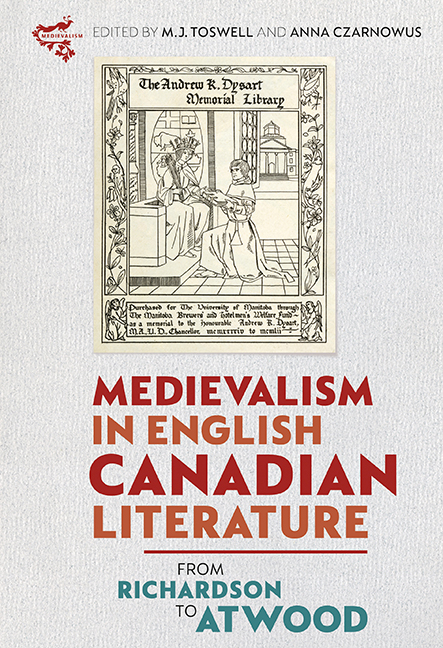Book contents
- Frontmatter
- Contents
- Introduction: English Canadian Medievalism
- 1 “Men of the North”: Archibald Lampman's Use of Incidents in the Lives of Medieval Monarchs and Aristocrats
- 2 “Going Back to the Middle Ages”: Tracing Medievalism in Julia Beckwith Hart's St. Ursula's Convent and John Richardson's Wacousta
- 3 John Richardson's Wacousta and the Transfer of Medievalist Romance
- 4 A Canadian Caliban in King Arthur's Court: Materialist Medievalism and Northern Gothic in William Wilfred Campbell's Mordred
- 5 Orientalist Medievalism in Early Canadian Periodicals
- 6 The Collegiate Gothic: Legitimacy and Inheritance in Robertson Davies's The Rebel Angels
- 7 Earle Birney as Public Poet: a Canadian Chaucer?
- 8 “That's what you get for being food”: Margaret Atwood's Symbolic Cannibalism 129
- 9 Lost in Allegory: Grief and Chivalry in Kit Pearson's A Perfect, Gentle Knight
- 10 Remembering the Romance: Medievalist Romance in Fantasy Fiction by Guy Gavriel Kay and Charles de Lint
- 11 Medievalisms and Romance Traditions in Guy Gavriel Kay's Ysabel
- 12 The Medieval Methods of Patrick DeWitt: Undermajordomo Minor
- Index
- Miscellaneous Endmatter
7 - Earle Birney as Public Poet: a Canadian Chaucer?
Published online by Cambridge University Press: 25 March 2020
- Frontmatter
- Contents
- Introduction: English Canadian Medievalism
- 1 “Men of the North”: Archibald Lampman's Use of Incidents in the Lives of Medieval Monarchs and Aristocrats
- 2 “Going Back to the Middle Ages”: Tracing Medievalism in Julia Beckwith Hart's St. Ursula's Convent and John Richardson's Wacousta
- 3 John Richardson's Wacousta and the Transfer of Medievalist Romance
- 4 A Canadian Caliban in King Arthur's Court: Materialist Medievalism and Northern Gothic in William Wilfred Campbell's Mordred
- 5 Orientalist Medievalism in Early Canadian Periodicals
- 6 The Collegiate Gothic: Legitimacy and Inheritance in Robertson Davies's The Rebel Angels
- 7 Earle Birney as Public Poet: a Canadian Chaucer?
- 8 “That's what you get for being food”: Margaret Atwood's Symbolic Cannibalism 129
- 9 Lost in Allegory: Grief and Chivalry in Kit Pearson's A Perfect, Gentle Knight
- 10 Remembering the Romance: Medievalist Romance in Fantasy Fiction by Guy Gavriel Kay and Charles de Lint
- 11 Medievalisms and Romance Traditions in Guy Gavriel Kay's Ysabel
- 12 The Medieval Methods of Patrick DeWitt: Undermajordomo Minor
- Index
- Miscellaneous Endmatter
Summary
MEDIEVALISM, WHICH ADDRESSES the pastness of the present in terms loosely related to the period between 500 and 1500 in Europe, carries a difference valence when the artist juxtaposing the modern world against the medieval is a trained and practising medievalist. John Gardner, for example, is for many a modern American novelist, but for those who study medievalism he is also a scholar who wrote books about Chaucer and the morality of fiction and taught courses at various universities on medieval subjects. His novel Grendel therefore strikes a fellow medievalist first in terms of its problematic and polemic relationship to Beowulf, and only secondarily for its presentation of the twelve signs of the zodiac or twelve philosophical approaches to human existence. Umberto Eco also has credentials as a medievalist, so that medievalists read The Name of the Rose with a more critical eye thinking about the niceties of life in a medieval European monastery and the highly abstruse details of medieval theology that Eco adduces in the novel. On the other hand, although Seamus Heaney completed an undergraduate degree in English in Ireland, and thereby learned basic Old English and some passages from Beowulf, medievalists offer to him a kind of intellectual freedom, and are willing to overlook minor peccadilloes or questions about register and tone in his remarkable poetic translation of the Old English epic poem – although rarely can they resist a casual reference to Heaney's amateur status as a translator from Old English. Jorge Luis Borges similarly gets nothing but approbation from medievalists when he chooses to translate Old English poems into Spanish or to write an introductory manual on Germanic medieval languages and literatures in Castilian Spanish to be used as a textbook in the hispanic world. And, to move closer to home, when the Canadian writer Alice Munro chooses to have the elderly male protagonist of her short story “The Bear Came Over the Mountain” (now better known as the movie Away From Her) be a retired English professor who specialized in Anglo-Saxon and Nordic (probably intending the more usual term Norse), medievalists rejoice in having broken – however tangentially – into the mainstream of modern literature.
- Type
- Chapter
- Information
- Medievalism in English Canadian LiteratureFrom Richardson to Atwood, pp. 113 - 128Publisher: Boydell & BrewerPrint publication year: 2020

